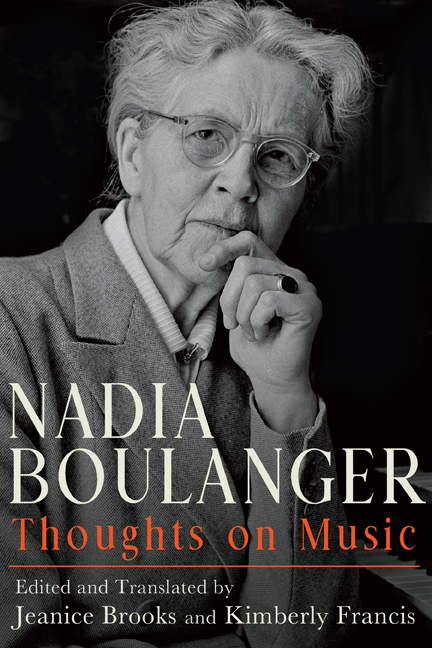Book contents
- Frontmatter
- Contents
- List of Illustrations
- Acknowledgments
- Editorial Apparatus and Critical Notes
- Note on Translations
- List of Abbreviations
- Timeline of Nadia Boulanger’s Life
- Introduction
- Part One Journalism, Criticism, Tributes
- Part Two Lectures, Classes, Broadcasts
- Bibliography of Nadia Boulanger’s Published Writing
- General Bibliography
- Index
Script for a Program of Haydn Trios, Recorded January 21, 1948, for the Club D’Essai
Published online by Cambridge University Press: 15 October 2020
- Frontmatter
- Contents
- List of Illustrations
- Acknowledgments
- Editorial Apparatus and Critical Notes
- Note on Translations
- List of Abbreviations
- Timeline of Nadia Boulanger’s Life
- Introduction
- Part One Journalism, Criticism, Tributes
- Part Two Lectures, Classes, Broadcasts
- Bibliography of Nadia Boulanger’s Published Writing
- General Bibliography
- Index
Summary
Works performed (all by Franz Joseph Haydn)
Trio in C major (Hob. XV:27)
Trio in E major (Hob. XV:28)
Trio in G major (Hob. XV:25, “Gipsy”)
Madame Astruc, Charles Bartsch, and I will play three trios by Haydn. We hope that you will take pleasure in hearing these trios again, which are no doubt familiar to you. The mean-spirited say they are simple. Let's not fall into this trap. These trios always have new surprises in store for us. Haydn's simplicity abounds with secrets and riches. His discretion requires us to be attentive—otherwise we lose the most precious part of his message. Certainly, his themes, striking as they are, are unforgettable, the clarity of the form imposes itself, and the technical execution proves infallible. The expressive variety is great and the range of emotions vast. The overall impression is of inimitable spontaneity. The music—cheerful, delightful, lively, exceptionally natural, yet also full of eloquence, invention and sensitivity, power and intensity.
Haydn was born in 1732 when Bach had just written the Saint Matthew Passion; he was at the beginning of his career as a composer at the moment when Bach's death in 1750 and Handel's in 1759 saw an age come to an end. Scarlatti, who died in 1757, paved the way toward the new era now opening up. Philipp Emanuel Bach and Stamitz laid its foundation. Haydn would decisively develop its essential traits. He served as a model for Mozart, whose short life cut Haydn's own in two; he was, in turn, influenced by Mozart, and also by Handel's oratorios, heard in London between 1790 and 1795. Haydn influenced the young Beethoven, who was born in 1770 and died in 1809; when Beethoven had already written the Pastoral Symphony, Schubert was nine years old, Berlioz—yes, I’m saying Berlioz—was six, but Wagner, Chopin, and Schumann will not be born until 1810! Thus, one can gain a better understanding of Haydn's tremendous influence. But let's go back to our trios. They are, in Haydn's mind, sonatas for piano, with violin and cello accompaniment, rather than concertante trios. However, the contribution made by the strings is essential.
- Type
- Chapter
- Information
- Nadia BoulangerThoughts on Music, pp. 431 - 434Publisher: Boydell & BrewerPrint publication year: 2020

